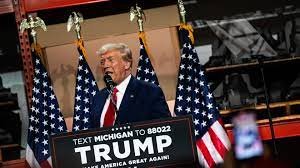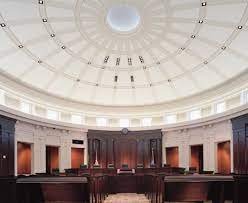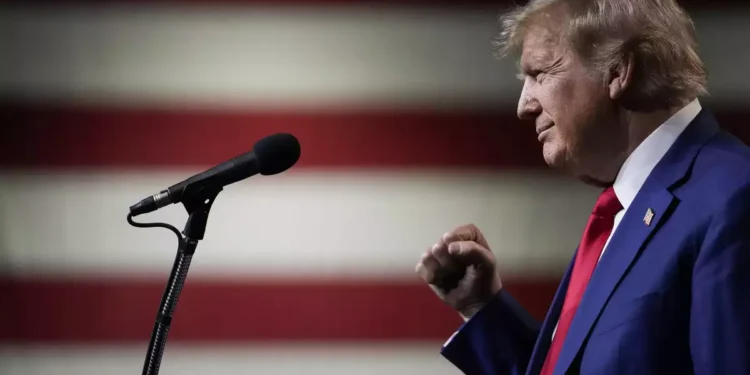
In a momentous legal clash unfurling within the epicenter of American political discourse, the Michigan Supreme Court has rendered a resounding decree, thwarting attempts to bar former President Donald Trump from gracing the state’s 2024 primary ballot. This pivotal pronouncement, anchored in the interpretation of the 14th Amendment, reverberates across the upcoming elections, ushering in broader debates on the intricacies of election eligibility.
Embarking on the Genesis of the Legal Struggle
The narrative unfolds with a strategic legal gambit, strategically deployed to preclude Trump’s inclusion in Michigan’s 2024 ballot—a state renowned for its pivotal role in presidential elections. The endeavor, challenging Trump’s eligibility, initiates a cascade of legal maneuvers culminating in the Michigan Supreme Court’s decree on December 27.
A Constitutional Scrutiny by Michigan SC
At the heart of the court’s pronouncement lies the nuanced interpretation of Section 3 of the 14th Amendment. Forged in the crucible of the post-Civil War era, this constitutional provision addresses the disqualification of individuals embroiled in rebellion or insurrection against the U.S. government from occupying public office. The court’s application of this historical amendment to a contemporary political luminary like Trump introduces strata of complexity into the legal panorama.
Divergent Legal Outcomes: A Tapestry of Legal Complexity
The Michigan legal saga stands in stark contrast to a parallel legal skirmish in Colorado mere weeks earlier. While the Michigan Supreme Court dismisses attempts to bar Trump, a Colorado court adjudicates to forestall Trump’s presence on the state’s 2024 ballot. The divergence in legal denouements across state lines underscores the jurisdictional intricacies and variances in construing constitutional tenets within the tapestry of modern politics.
Affirming Lower Court Decree: Cementing Legal Precedence
The Michigan Supreme Court’s verdict effectively upholds a lower court’s ruling sanctioning Trump’s participation in the 2024 primary. This not only cements the legal precedent within the state’s confines but also dispatches a signal to other jurisdictions grappling with analogous quandaries. The hierarchical underpinnings of the judicial system and the gravity of precedent come to the fore, molding the legal topography for prospective cases of akin nature.
Implications for the 2024 Electoral Theater

The rebuff of attempts to bar Trump from the 2024 ballot carries weighty ramifications for the impending elections. Donald Trump, a figure of polarizing mien in American political annals, preserves his entitlement to partake in Michigan’s pivotal primary. This determination is poised to influence the stratagems of political actors, reshape the dynamics of campaigning, and ultimately steer the trajectory of the 2024 electoral process.
Political and Public Reverberations
As the Michigan Supreme Court’s pronouncement reverberates through the political milieu, responses cascade from diverse quarters. Political savants, pundits, and the populace proffer a spectrum of viewpoints on the adjudication. Some extol the court for upholding democratic tenets, underscoring the imperative of letting voters arbitrate a candidate’s destiny. Meanwhile, detractors articulate misgivings about Trump’s alleged involvement in the events surrounding the U.S. Capitol storming, injecting an additional layer of complexity into the public dialogue.
Legal Precedent and Prospective Trials
The Michigan legal tableau is not a solitary episode; it portends to establish a legal precedent for analogous conundrums across the expanse of the nation. As the 2024 election season unfolds, legal skirmishes over candidate eligibility are anticipated to endure. The construal of constitutional precepts and their application to contemporaneous political scenarios will persist as subjects of scrutiny, sculpting the panorama of American democracy.
The Expansive Legal Terrain
Beyond the immediate repercussions for the 2024 elections, the Michigan legal saga contributes to the broader legal terrain enveloping election eligibility. It instigates a reevaluation of constitutional provisions in the context of modern political actualities, underscoring the significance of a resilient legal framework to navigate the convolutions of contemporary democracy.
An Epochal Juncture in American Politics

The Michigan Supreme Court’s dismissal of attempts to bar Trump from the 2024 ballot signifies an epochal juncture in American politics. The court’s reliance on the 14th Amendment, the divergence in legal outcomes across states, and the far-reaching implications for the 2024 elections collectively confer gravity upon this decree. As the nation negotiates the intricate nexus of law and politics, the Michigan legal saga will assuredly resonate as a seminal occurrence in the ongoing evolution of American democracy.










